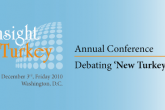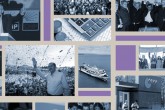The talk of a “new Turkey” is generating lively debates both in Turkey and abroad. Last week we discussed Washington where the US government was trying to recover from the embarrassment of WikiLeaks.
It was a conference organized by Insight Turkey, a quarterly published by the Foundation for Political, Economic and Social Research (SETA), in Washington, D.C. At the conference Levent Köker, Ersel Aydınlı, Dilek Cindoğlu, Taha Özhan, Amjad Atallah, S. Trisa, İbrahim Kalın, Hajruddin Somun, Ömer Taşpınar, Stephen Larrabee and Nuh Yılmaz elaborated on Turkish politics, Turkey’s regional policy and Turkish-American relations. What seemed certain at the end of the debates was that a new Turkey is in the making.
Indeed, knowing the “old Turkey” well, I strongly sense that the country where I live now doesn’t look much like the old one.
The old Turkey was a country where people were supposed to serve and remain loyal to the state and satisfy the demands of the state elite. It was a country that existed for the state and its owners, i.e., the state elite. Citizens were commanded to be stripped of their ethnic, religious and even ideological identities. In the old Turkey, the nation was imagined to be homogenous despite the diversities on the ground. The old Turkey was based on a notion of the superiority of the state over the society — an understanding that gave a privileged status and power to the bureaucracy over the citizens, which is an anomaly by any democratic standard. It was a republic in which the civilian and military bureaucracy imagined for itself a “right to rule.” Thus, military takeover was the rule in the old Turkey. Our generals thought they were not only commanding their troops but the country. They hanged a prime minister, made constitutions, closed down political parties and destroyed the lives of millions. Civilians were not in a position to challenge the power of the juntas in the military; they were imprisoned by their own military.
In the old Turkey, the economy was run by the state, to be more specific, by unrepresentative and unaccountable bureaucrats, sitting in a position to redistribute the resources of the nation. The old Turkey was an inward-looking country where relationships with the world were at a minimum. This was a country and society in which it was convenient to be “ruled by fear.”
The old Turkey thus feared anything foreign and different. It not only had external enemies but also plentiful “internal enemies.” Any different identity, ethnicity, religion or ideology was treated as a threat. The old Turkey was a burden for its Western allies, too. It was unable and unwilling to resolve its own problems at home and abroad.
Since 1999, with the start of the EU integration process, which unleashed domestic dynamics for change, the old Turkey has begun fading away. The ideas and ideals of democracy, the rule of law and respect for human rights and minorities and a market economy have gained currency in this old country. As a result, for the last 10 years or so Turkey has been going through a tremendous process of change. Change is everywhere: in politics, business, civil society and foreign affairs. We should try to understand the dynamics and actors of this new Turkey. And we should not make a mistake in identifying the driving forces behind the efforts to build a new Turkey. I think it is not the political leadership but social and economic forces that we need to look at to understand the dynamics pushing for the new Turkey. We make a fatal mistake if we think that the new Turkey is the Justice and Development Party’s (AK Party) Turkey. It is a phenomenon that goes far beyond it. The new Turkey is being created by a new business elite, new media, a new generation of intellectuals and an assertive civil society. A feature of the new Turkey is its self-confidence. It is now a country that says, “Yes, we can.” Democracy is becoming firm and irr
In this article
- Domestic Policy
- 1999
- Emergence
- European Union (EU)
- Global Actors | Local Actors
- Human Rights
- Ibrahim Kalın
- Insight Turkey
- new
- of
- Prime Minister
- SETA
- Turkish Foreign Policy
- Turkish Presidential Spokesperson
- Turkish-American Relations
- Türkiye-US Relations
- Türkiye's Justice and Development Party | AK Party (AK Parti)
- United States (US)
- Western World


